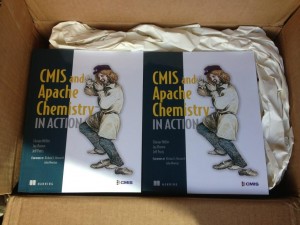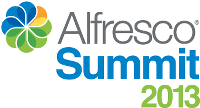 With a final, heroic push and get-out-the-vote campaign, the OASIS CMIS Technical Committee (TC), the committee that is responsible for moving the CMIS specification forward, was able to get enough votes on Thursday to ratify the next version of Content Management Interoperability Services (CMIS) as a standard. This is a seriously cool accomplishment for everyone on the TC and the entire Enterprise Content Management (ECM) industry because CMIS establishes an industry standard for working with repositories like Alfresco, Documentum, FileNet, Nuxeo, and SharePoint, and it is important that the spec continues to evolve.
With a final, heroic push and get-out-the-vote campaign, the OASIS CMIS Technical Committee (TC), the committee that is responsible for moving the CMIS specification forward, was able to get enough votes on Thursday to ratify the next version of Content Management Interoperability Services (CMIS) as a standard. This is a seriously cool accomplishment for everyone on the TC and the entire Enterprise Content Management (ECM) industry because CMIS establishes an industry standard for working with repositories like Alfresco, Documentum, FileNet, Nuxeo, and SharePoint, and it is important that the spec continues to evolve.
CMIS 1.1 has some exciting new features. Here’s a re-cap of what’s new…
Browser Binding
A binding is the protocol a client uses to talk to a CMIS server. CMIS 1.0 supported two bindings, Web Services (SOAP) and AtomPub (RESTful XML), the latter being the most performant and the most popular. But if you’ve ever looked at the XML that comes back from a CMIS AtomPub call you know how verbose it can be. The Browser Binding is based on JSON, so the payloads that go between client and server are smaller, making it the fastest of the three bindings. The original purpose of the Browser Binding was to make it easy for those building “single page” web apps or doing other work with CMIS via client-side JavaScript, but I think apps of all types will move to the Browser Binding as quickly as possible simply because it is easier to work with.
Type Mutability
This allows CMIS developers to create and update the repository’s content model with code. Imagine you’re building an Accounts Payable solution. You’re using CMIS because you want your solution to run on top of any CMIS-compliant ECM repository. It is highly likely you will need content types to store objects with metadata specific to your solution. Before CMIS 1.1, you have to ship repository-specific content models and installation and configuration instructions with your app. With CMIS 1.1, developers can simply write install and config logic as part of the solution that will interrogate the repository to determine if any changes need to be made to the content model to support the solution, and if changes are required, implement them.
Secondary Types
Some repositories (like Alfresco) have the concept of free-floating or cross-cutting content types that group together related properties that can be added to object instances in the repository. For example, perhaps you want to define a “client-related” set of properties that can be added to any document in the repository that is related to one of your clients. Not all documents are related to a client, but the ones that are need to be able to refer to a client name or number or something. In Alfresco, these are called “aspects”. CMIS 1.0 didn’t support aspects natively so developers using CMIS to query for or set properties defined in an aspect had to use a workaround. In CMIS 1.1, aspects are supported natively.
New “Item” Type
In CMIS 1.0, Document objects are assumed to have a content stream. Some repositories even require it. In Alfresco, this means if you want to work with a type that inherits from something other than cm:content (or cm:folder), you are out-of-luck. CMIS 1.1 adds a new base object type called “Item” that represents objects that don’t have a file associated with it.
Bulk Updates
CMIS 1.1 adds a new feature that makes mass changes more performant. Instead of iterating over a list of objects, changing and saving each one, you can define a set of property changes and make those against an entire collection, which is much more efficient.
Append to Content Stream
A challenge with any ECM project is how to move large files into the repository. The new append to content stream feature in CMIS 1.1 allows you to send files to the repository in chunks which could be a key to addressing that challenge.
Retentions and Holds
This new feature allows you to set retention periods for a piece of content or place a legal hold on content through the CMIS 1.1 API. This is useful in compliance solutions like Records Management (RM). Honestly, I am not a big fan of this feature. It seems too specific to a particular domain (RM) and I think CMIS should be more general. If you are going to start adding RM features into the spec, why not add Web Content Management (WCM) features as well? And Digital Asset Management (DAM) and so on? I’m sure it is useful, I just don’t think it belongs in the spec.
So that’s what’s new in CMIS 1.1. You can read the authoritative spec for details.
When Will My Favorite Repository Support CMIS 1.1?
That’s up to each vendor. If these features are important to your installation or the solution you are building, you should be making it very clear to your vendor contacts that you want to see these features get priority over other things the engineering team might be working on. As for Alfresco, I can’t make any promises on dates. We’ve had experimental support for the browser binding in place for some time. I think we all want to see the other CMIS 1.1 features in both Alfresco on-premise and in the cloud sooner rather than later, but I don’t know when that will be.
Try It!
You can play with CMIS 1.1 by downloading the OpenCMIS InMemory Server from Apache Chemistry and a client library for your favorite language, or just launch the OpenCMIS Workbench and you’ll see the Browser Binding as an option when you connect. If you need to know more about CMIS and the client libraries, server frameworks, and CMIS development tools available at Apache Chemistry, you should buy the book Jay Brown, Florian Mueller, and I have been working on. It should be in print later this summer but you can get the eBook now. It covers both CMIS 1.0 and CMIS 1.1.



